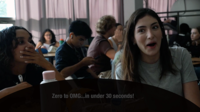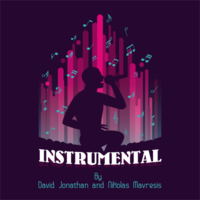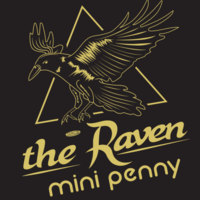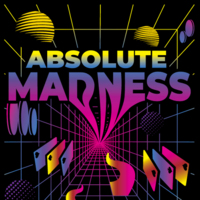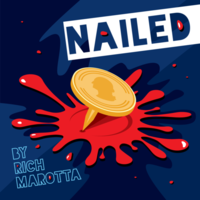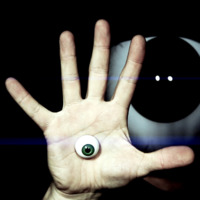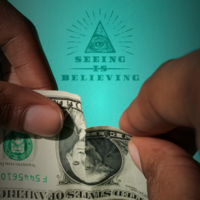All Seeing Eye by Dan Harlan (Instant Download)
A mind-reading masterpiece you can do anytime anywhere. START LEARNING INSTANTLY.
Dan Harlan’s favorite method for obtaining secret information is bold, brilliant, and now it lives in your pocket. Your spectator can literally write or draw anything they want to, and the only special preparation needed can be done at a moment's notice. Incredibly, it is also instantly resettable and completely examinable. You’ll see everything when you perform The All Seeing Eye by Dan Harlan.
Here’s what happens:
Your spectator writes or draws anything they want on the piece of paper. It’s securely folded up and held in their hand. You then draw an eye on another piece of paper that will give you the ability to see the hidden information inside their hand. You press the eye to your forehead, then fold it up and have your spectator hold the eye with their folded piece of paper. You are then able to divine the exact information they wrote on their paper. They can immediately examine everything.
The All-Seeing Eye has become a favorite billet peek of professional magicians and mentalists around the world. It’s nearly impromptu and shockingly easy to perform. All you need is a few pieces of paper and something to write with to perform this mind-reading miracle. This technique is great for revealing a hidden word but is just as easily used for a drawing duplication or any mental magic where you reveal secret information. Dan’s handling and method creates strong psychological moments that are impossible for even the cleverest layperson to backtrack. If you want to see everything, you need to perform The All Seeing Eye by Dan Harlan.
ASK HERE
Featured Magic Tricks
Customer magic Acts that feature this trick
4 star 13%
3 star 4%
2 star 0%
1 star 1%

 All Seeing Eye
Report this review
All Seeing Eye
Report this review
Difficulty: The difficulty level is geared towards beginners both in Harlan's teaching and in technicality. ASE is very easy to perform. It's a standard and well known method in mentalism that is used to achieve the effect, but where the real value is is in Harlan's structure, presentation, and additions. I'll get into those later in the bottom of this review.
A few positives:
-Like any center tear, peek, or switch routine in mentalism, the props are regular, everyday objects. If the required props (any pieces of paper + a writing utensil) are available, ASE can be performed impromptu. In his instructional video, Dan is honest and claims that it takes a few seconds of preparation to perform, explaining that it is almost impromptu. However, this preparation can be quickly done in front of the audience without arousing any bit of suspicion.
-Everything can be examined.
-They can keep the papers as a souvenir, which is a bonus if you choose to perform with your business cards.
-ASE is perfect for table hopping + avenues that require multiple performances because it instantly resets.
-Harlan's teaching is fantastic--it's very clear. He is thorough without rambling. While watching, it is obvious that ASE has been tried and tested. The video quality is very clear.
-This a great intro effect for beginners with billet work, but I can guarantee more experienced performers will come away with a new idea or with something learned. Even if you're a working pro, I'd recommend ASE--It has a few presentational touches that I think are essential for those who do any work with billets/tears/switches/peeks. I think this would be a wonderful addition to many walk around magician's repertoires.
A few negatives:
-The patter may seem a bit childish to some, or a little cheesy. Harlan's included patter will have to be modified for many performers. The presentation/patter fits with my personality/character, so I didn't have to do much modification.
-Some may say that the fact that two pieces of paper (the "all seeing eye" and their information) is in play (as opposed to a single piece of paper) has potential to complicate the plot and take away from some of the directness that other methods have. This is not an issue for me, since the plot of the effect remains simple (and able to be described in one sentence as The Professor notes.)
-It requires a few seconds of preparation. As I stated above, this can be quickly done in front of the audience before the performance.
-The sound gets a little weird/distorted mid-video, but it won't have any effect on learning the effect. It wasn't a distraction.
I promised earlier in this review that I would talk about Harlan's additions to this classic effect in mentalism. This is ASE's greatest strength. In billet effects, there is often no justification for the "revelation-of-secret-info-on-a-sheet-of-paper" effects; they are often performed just like that (hence the name I just coined). I've seen countless performers ask their audience to write down a piece of information. They will then take the sheet of paper, execute some action with it, and usually end with placing it in the spectators hand. They will then immediately revealing the name, date, or whatever was written down. While this may fool or even entertain the audience, this is the worst way to perform such an effect. What is the purpose in having someone write down information, only to tear the paper up and reveal the information? Why not just have the audience think of something, THEN reveal it?
What Dan's version accomplishes is that his presentation serves as a justification for every action completed by the performer. Every hand movement, transfer of objects, every word has some psychological purpose in his routine. This solves the main presentational problem of the center tear, peek, switch, etc. The writing of the information is justified through presentation. Harlan shows a great psychological understanding of the motivation behind movements, and this is very helpful in his teaching. This new presentation and way of approaching the "write and reveal" effects is worth this download. Although I have my own presentation that justifies the actions of such an effect, I enjoyed hearing Dan Harlan's take on it, and came away with new ideas. Any magician/mentalist, beginner to pro will benefit from this download.
Disclaimer: I do not write reviews without "field testing" the product. ASE does very well in performance, and I did not encounter any obstacles.
-Zachary Johnston

 I would have called it Choreography. And I highly recommend it.
Report this review
I would have called it Choreography. And I highly recommend it.
Report this review
The theater, the theater, what's happened to the theater?
Especially where dancing is concerned
Chaps who did taps aren't tapping anymore
They're doing choreography
Chicks who did kicks aren't kicking anymore
They're doing choreography
And that’s what Dan Harlan has done with All Seeing Eye. He’s taken magic that we know and choreographed it into a beautiful routine. There are no false moves, nothing strange, nothing unusual. Everything flows. Each move feeds the next. Everything has a purpose. This is a very straightforward and the cleanest “write something on a card” and I will tell you what you wrote” routine you will ever see.
Watch the trailer. Dan justifies writing something down. You are using “your third eye” to see their writing while it is in their hand. You aren’t reading their mind (if you were, why would they need to write it?). You start clean. You not only end clean you end clean with everything in the spectator’s hand. And you end reset. They will remember that they wrote something and folded it up. You drew your Third Eye and they took it and shook the cards together. And then you knew what they wrote. There is no explanation.
I would have called it Choreography. And I highly recommend it.

 Impressed!
Report this review
Impressed!
Report this review
All in all, I honestly can't think of anything bad to say about this one. Plus, it's the kind of routine that can be customized to your own personal liking. I like that as opposed to being confined to the original patter.

 Excellent Mindreading Trick
Report this review
Excellent Mindreading Trick
Report this review
Pros:
- Uses normal items, easily obtained just about anywhere you are
- All moves are justified
- Instant reset / no clean up
- Spectator gets to keep the papers at the end
Cons:
- Requires some setup, though minimal and fast
- Cannot use certain items (but this is minimal and explained in the teaching)
Review:
This is a very nice alternative to other, more traditional methods for revealing a spectator's thought of word. It's fairly easy to learn, though like many mentalism items it will require a bit of audacity. Performed correctly, this will easily baffle the audience.
It is well taught as he takes his tune explaining everything in detail.
If you are looking for a quick and easy way to reveal a thought of word, give this a look. I like the logical progression and giving the spectator souvenirs at the end.
Please note, as taught, this is tied to the presentation of an "All-Seeing Eye" so make sure that fits with your style. It can be changed up with a little thought and practice, but I've yet to find a spectator that questions the presentation at all.
Thanks!

 misleading trailer
Report this review
misleading trailer
Report this review
Yes, there are is some good thinking here, but there are also two suspicious moments in the routine which do not show in the trailer. Without seeing these, it is impossible to evaluate the strength of the routine, imo. These moves have justification, but it is weak and (in the second case) just goofy and out of place. Bottom line: this is not as squeaky clean as the trailer (and many of the comments) would lead you to believe.
So, I will not use this. I will continue to use some of the other, less transparent methods for this type of effect. I will also be much more careful when purchasing downloads, even when they are so highly rated.

 Sweet!!!
Report this review
Sweet!!!
Report this review

 4 1/2 Stars -- Solid Routine
Report this review
4 1/2 Stars -- Solid Routine
Report this review
This routine is fluid, justified and meets my standards for "organic" magic: ready-to-go, streamlined (for the most part, see my note), justified and clean nearly all-around.
If you're familiar with getting information with business cards (or index, or whatever) you may not need something new. On the other hand for the same reasons you may want to add this to your available tools/tricks in the arsenal.
I will, starting today as I test it out.
I enjoy Dan's presentation (I love his confidence and enthusiasm for this trick) This is just a personal preference, but I don't like pretending I have powers of one kind or another. This isn't unique to this trick of course. And my answer is to this is stupid, my it makes me feel better.
For a lot of my tricks I just say, "I can't really do this (or that), or I don't have this power, but if I did, I think this is what it would look like." Silly, sure, but the one line and the way I present it tongue in cheek allows me to feel comfortable with such presentations as these (including the one he uses here).
There is "handling" but it isn't excessive. It fits absolutely into the routine as presented with no wasted moments. So if you like the routine, you'll love this trick. You just need to be comfortable. It is far within the realm of anyone doing these kinds of routines where you gather info in similar fashion (and in this case it's a great way to get the info... no stress for time, angles, etc).
If you like what you see in the trailer, you won't be disappointed. It's quite good. Thanks for sharing Dan.

 Best Impromptu mentalism
Report this review
Best Impromptu mentalism
Report this review

 Get This!
Report this review
Get This!
Report this review
However, the audio quality changes near the end and there is a very slight background "elevator" music I didn't care for. But Harlan's teaching is great as always.

 A solid trick
Report this review
A solid trick
Report this review
None of the steps are difficult and after some short practice you'll be ready to go.
Glad to have added this one!

Act Builder beta







